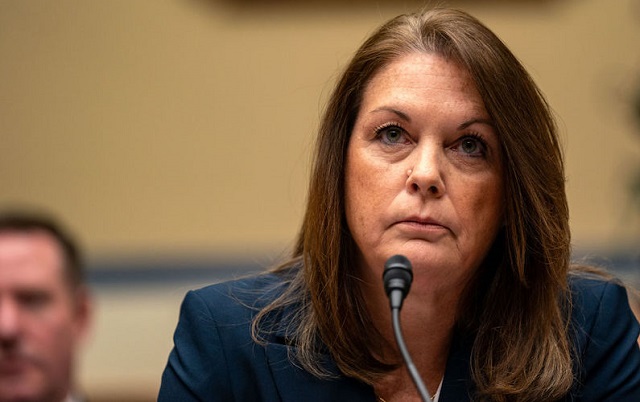United Sates Secret Service Director Kimberly Cheatle testifies before the House Oversight and Accountability Committee during a hearing at the Rayburn House Office Building on July 22, 2024 in Washington, DC.
Kent Nishimura/Getty Images
By Emily Mangiaracina
Secret Service Director Kimberly Cheatle has finally announced she will step down after being roundly slammed by a bipartisan committee during a congressional hearing for her failure to prevent the assassination attempt on Donald Trump.
U.S. Secret Service Director Kimberly Cheatle has stepped down amid resounding, bipartisan calls for her resignation by congressmen following the assassination attempt on former President Donald Trump.
Three sources confirmed to NBC that Cheatle officially resigned on Tuesday morning. In her letter of resignation, shared by a senior official, Cheatle wrote that she takes “full responsibility for the security lapse.”
“In light of recent events, it is with a heavy heart that I have made the difficult decision to step down as your Director,” she wrote.
President Joe Biden said in a statement following Cheatle’s announcement of her resignation that he will appoint a new head of Secret Service “soon.” He has ordered an “independent review” to investigate the day’s events.
In response to Cheatle’s resignation, Trump wrote on Truth Social: “The Biden/Harris Administration did not properly protect me, and I was forced to take a bullet for Democracy. IT WAS MY GREAT HONOR TO DO SO!”
Her decision comes a day after being grilled under subpoena by Republican and Democrat members of the House Oversight Committee, who ripped her both for the grave Secret Service lapse that allowed Trump to be shot and for her refusal to answer simple questions during the hearing.
The leading Democrat member of the panel, Rep. Jamie Raskin (D-Md.), accused Cheatle of having “lost the confidence of Congress at a very urgent and tender moment in the history of the country.”
Rep. Nancy Mace (R-S.C.) slammed Cheatle as “full of s***” and “completely dishonest” for not giving direct answers to questions, including about providing “audio and video recordings” in her possession that were taken the day of the Trump assassination attempt.
“How did a 20-year-old loner with a week’s notice pick the absolute best location to assassinate President Trump when the entire Secret Service missed it?” asked Rep. Pat Fallon, R-Texas. “Director Cheatle, on your leadership, your agency got outsmarted and outmaneuvered by a 20-year-old. How can we have any confidence that you could stop trained professionals from a nefarious nation state?”
The Secret Service director was unable to provide explanations as to why the roof used by Crooks to shoot at Trump was not secured the day of the shooting and why Trump was allowed to speak on stage while the Secret Service was aware that a suspicious man was present on the grounds that day. At one point, she claimed she did not “have the timeline of how the individual accessed the roof, where they accessed the roof, or how long they were on the roof.”
She said, however, that all the security resources requested “for that day” were provided.
Cheatle resisted calls to resign prior to Tuesday, with a Secret Service spokesperson declaring last week that she had no intention to resign even after mounting calls for her to step down.
Critics across the board have described the security breach at Trump’s Pennsylvania campaign rally as a “catastrophic failure” of the Secret Service. Video footage emerged online of attendees from the Trump rally alerting police to the gunman, 20-year-old Thomas Matthew Crooks, positioned on a roof toward the rally stage, highlighting one of many security failures that day to prevent the assassination attempt. One man present that day told the BBC he was “pointing” at the gunman on the roof for two or three minutes.
Counter-snipers fatally shot Crooks after one of his shots grazed the former president’s right ear, bloodying him. However, Crooks killed a rally attendee, identified as 50-year old Corey Comperatore, a former fire chief. Two other Pennsylvania residents were shot, but are reportedly in stable condition.
















